 Petzlover
Petzlover Finnish Hound is originated from Finland but Welsh Corgi is originated from United Kingdom. Finnish Hound may grow 32 cm / 13 inches higher than Welsh Corgi. Finnish Hound may weigh 10 kg / 23 pounds more than Welsh Corgi. Finnish Hound may live 4 years less than Welsh Corgi. Both Finnish Hound and Welsh Corgi has same litter size. Finnish Hound requires Low Maintenance. But Welsh Corgi requires High Maintenance
Finnish Hound is originated from Finland but Welsh Corgi is originated from United Kingdom. Finnish Hound may grow 32 cm / 13 inches higher than Welsh Corgi. Finnish Hound may weigh 10 kg / 23 pounds more than Welsh Corgi. Finnish Hound may live 4 years less than Welsh Corgi. Both Finnish Hound and Welsh Corgi has same litter size. Finnish Hound requires Low Maintenance. But Welsh Corgi requires High Maintenance
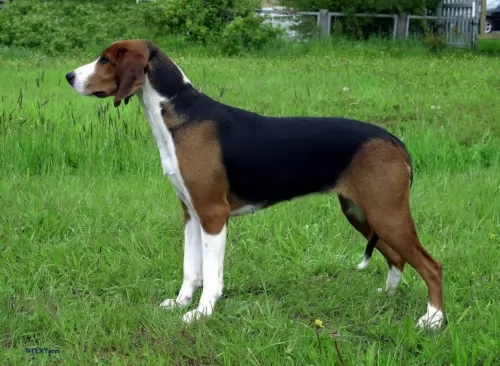 As one of Finland’s most popular dogs, the Finnish Hound isn’t particularly well known outside of Finnish borders. Known also as the Finsk Stovare, the Finnish Hound, known for its hunting skills, came about because of a breeding effort which started way back in the 1800s, mixing dogs such as different French, Swedish, and German hounds.
As one of Finland’s most popular dogs, the Finnish Hound isn’t particularly well known outside of Finnish borders. Known also as the Finsk Stovare, the Finnish Hound, known for its hunting skills, came about because of a breeding effort which started way back in the 1800s, mixing dogs such as different French, Swedish, and German hounds.
These hounds were used with the idea being to develop a dog that could do well in Finland’s terrain. The Finnish Hound is a great hunting dog but isn’t looked upon as an particularly awesome pet, although some pet owners would beg to differ.
 The Pembroke Welsh Corgi and the Cardigan Welsh Corgi were once considered to be two types of the same breed. Today they are recognized as very different breeds, but cousins of sorts.. They are alike in many ways and very different in others. The general information in terms of height and weight above applies to the more popular and better known Pembroke Welsh Corgi, developed as a herding dog from the spitz line in Pembroke shire, Wales. The Pembroke is famous for being the breed favored since childhood by Queen Elizabeth, the current queen of England. It’s believed that the Pembroke came to the country around the 10th century with Flemish weavers. The Cardigan is thought to have come with the Norse people and be a relative of the Sedish Vallhund.
The Pembroke Welsh Corgi and the Cardigan Welsh Corgi were once considered to be two types of the same breed. Today they are recognized as very different breeds, but cousins of sorts.. They are alike in many ways and very different in others. The general information in terms of height and weight above applies to the more popular and better known Pembroke Welsh Corgi, developed as a herding dog from the spitz line in Pembroke shire, Wales. The Pembroke is famous for being the breed favored since childhood by Queen Elizabeth, the current queen of England. It’s believed that the Pembroke came to the country around the 10th century with Flemish weavers. The Cardigan is thought to have come with the Norse people and be a relative of the Sedish Vallhund.
The Cardigan Welsh Corgi, also a herding dog has their ancestry in ancient Celtic dogs. They are older than the Pembroke and hail from Cardiganshire, Wales.
Both breeds are friendly, smart and independent. Both dogs herd cattle and sheep. About the end of the 19th century, farmers in Cardiganshire began to raising sheep rather than cattle. The corgis were herding dogs for cattle. “Heelers” who avoid the cattle kicking them by nipping at the cattle’s heel. Pembrokeshore and Cardiganshire are counties in South West Wales that adjoin each other.
Then the move was made from cattle to sheep in Cardiganshire they bred their corgis with the Welsh Sheepdog where the merle color is said to come from, and the Pembroke Welsh Corgi. This caused the similarities between the two dwarf breeds. At the same time the distance grew between the two breeds and they grew into very distinct and different looking dogs. There are also some differences in their personalities.
The first corgi to appear at Crufts came in 1927 and in 1928 a Pembroke won a championship at Cardiff for the first ever corgi win. It was not until 1934 that the kennel club recognized them as separate breeds rather than a Pembroke shire type and a Cardiganshire type. From this point on the two are separate breeds with tremendous similarities. A Pem won the Reserve Best in Show at Crufts in 1955.
The first corgi came to the United States in 1933 by a breeder of Old English Sheepdogs. In 1934 the American Kennel Club (AKC) recognized Corgis as one breed with 2 types. The Pembroke has always been the more popular of the two.
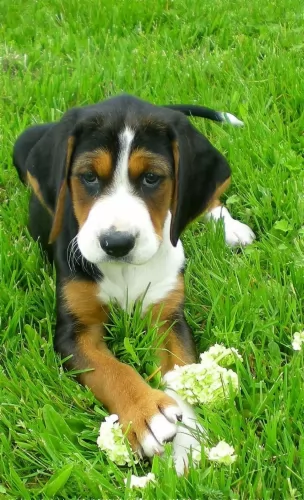 This is a medium sized dog who stands between 52 – 62cm in height and weighs in at 20 to 25kg. The Finnish Hound can have between 4 – 8 puppies.As a scent-hound, the Finnish Hound has a short, smooth double coat which is usually in a tri-color pattern of black, tan, and white.
This is a medium sized dog who stands between 52 – 62cm in height and weighs in at 20 to 25kg. The Finnish Hound can have between 4 – 8 puppies.As a scent-hound, the Finnish Hound has a short, smooth double coat which is usually in a tri-color pattern of black, tan, and white.
The attractive dog has an athletic, lean, muscular body full of energy and stamina. The eyes are brown and the dog has a peaceful expression. The medium length ears are floppy and the tail is long and carried low.
The Finnish Hound is friendly, calm and never aggressive. He is an intelligent dog nd will respond to the training and socialization he will require to turn him into an obedient, amicable pet, especially since he tends to be stubbon, independent and strong-willed. He isn’t recommended for small places in the city but will do better in the country with a fairy large piece of ground. The Finnish Hound is not recommended for apartment life. It is moderately active indoors and does best with at least an average-sized yard.
 They used to differentiate between the Cardigan and the Pembroke by saying the Cardigan was the one with the bigger ears and the Pembroke had no tail. In many parts of the world where tail docking has been banned, most Pembrokes now have tails. Only those born without don’t have them. Both dogs are long and low to the ground with big chests and short legs. This is because they are dwarfs. They are not little dogs.
They used to differentiate between the Cardigan and the Pembroke by saying the Cardigan was the one with the bigger ears and the Pembroke had no tail. In many parts of the world where tail docking has been banned, most Pembrokes now have tails. Only those born without don’t have them. Both dogs are long and low to the ground with big chests and short legs. This is because they are dwarfs. They are not little dogs.
The Cardigan Welsh Corgi is heavier boned than the Pembroke, has large rounded ears and a flowing, fox like tail. The Cardigan comes in a variety of colors but never predominately white. He is double coated with a dense, harsh outer and a soft, short and thick undercoat.
Pembroke is smaller and longer than the Cardigan with pointed ears. They are intelligent, sturdy and strong with tremendous stamina. The tail is docked in the United States or the pups are bred not to have a tail. This was originally so that the cattle could not step on their tails and injure the dogs. The double coat on the Pembroke is short and weather resistant inner coat with a longer and rougher outercoat. He has the same deep dropped chest as the Cardigan. Both corgis shed voraciously.
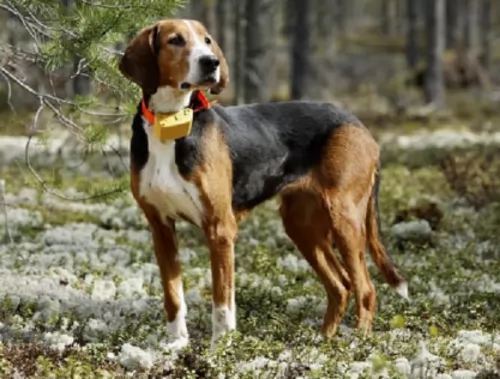 The Finnish Hound has always been a working dog and so he will require being well exercised.
The Finnish Hound has always been a working dog and so he will require being well exercised.
He makes a good pet with homes where there are other dogs as well as children. As a hunting or working dog, these days the Finnish Hound is also regarded as a companion animal, fitting into family life well, and turning out to be a loving, loyal pet.
 1Children friendliness For the most part they are good but can be grumpy and bossy. They are bossy personalities
1Children friendliness For the most part they are good but can be grumpy and bossy. They are bossy personalities
3.Adaptability – Very. Can live anywhere but they do need to run and they bark a lot.
4.Learning ability – incredibly smart but stubborn. Respond well to training that is reward based.
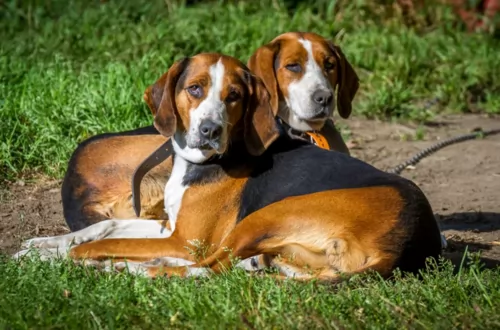 The Finnish Hound is looked upon as a generally healthy breed who can get to 12 years of age if looked after well. Good nutrition plays a huge role towards excellent health.
The Finnish Hound is looked upon as a generally healthy breed who can get to 12 years of age if looked after well. Good nutrition plays a huge role towards excellent health.
Check out common health ailments that can affect most dogs such as dental disease, obesity, hip dysplasia and a serious condition for which these dogs are particularly known – cerebellar ataxia. Lesions in the brain affect the dog’s coordination and sight. Get him to the vet as soon as you detect anything unusual with your pet.
 • Degenerative Myelopathy – a muscular neurological disease very similar to Lou Gehrig’s Disease or ALS. It is always fatal.
• Degenerative Myelopathy – a muscular neurological disease very similar to Lou Gehrig’s Disease or ALS. It is always fatal.
• Some have cardiac issues while others may have hip dysplasia or Von Willebrand’s disease.
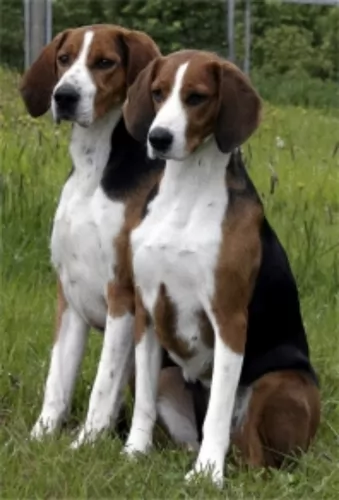 As a medium-sized dog breed, you want to make sure to feed your dog a high-quality commercial dog food – one that has been formulated with the right amount of vitamins and minerals for the type of dog he is.
As a medium-sized dog breed, you want to make sure to feed your dog a high-quality commercial dog food – one that has been formulated with the right amount of vitamins and minerals for the type of dog he is.
He is a high-energy hunting breed, so you wan to find a food that is appropriate to his needs. Home cooked brown rice, vegetables and chicken can be added into his kibble as a change and a treat from time to time as well as some raw meat occasionally. Make sure he always has access to fresh, cool water.
Physically active and mentally balanced and intelligent, the Finnish Hound will require both physical and mental stimulation to prevent him from becoming bored and frustrated.
As an average shedder, your pet's smooth, short-haired coat is easy to keep in tip top condition. All that is really required is to brush the coat down twice a week to keep it in peak condition.
Don’t neglect to check the inside of the dogs ears, as too much dirt and wax can cause nasty ear infections. Also, the teeth need to be brushed at least 2 or 3 times a week with special canine toothpaste and toothbrush. This will ward off tooth decay and lots of other problems within the body brought about by bad teeth.
 1Feeding the puppy prone to overweight, the pem needs ½ to 1 cup of small breed high quality food in 3-4 meals per day. The Cardigan needs ¾ to 1 ¼ cups of high quality small breed food in 3-4 meals per day.
1Feeding the puppy prone to overweight, the pem needs ½ to 1 cup of small breed high quality food in 3-4 meals per day. The Cardigan needs ¾ to 1 ¼ cups of high quality small breed food in 3-4 meals per day.
2.Feeding the adult – Don’t overfeed them. The Pem need 1 cup per day of high quality small breed food in 2 meals per day. The Cardigan needs 1-1 ½ cups per day in one to two meals.
They are fast, athletic dogs. Agility, CAT, Barnhunt. Herding trials, flyball and they just love backyard ball fetching. Confirmation and obedience, along with rally.